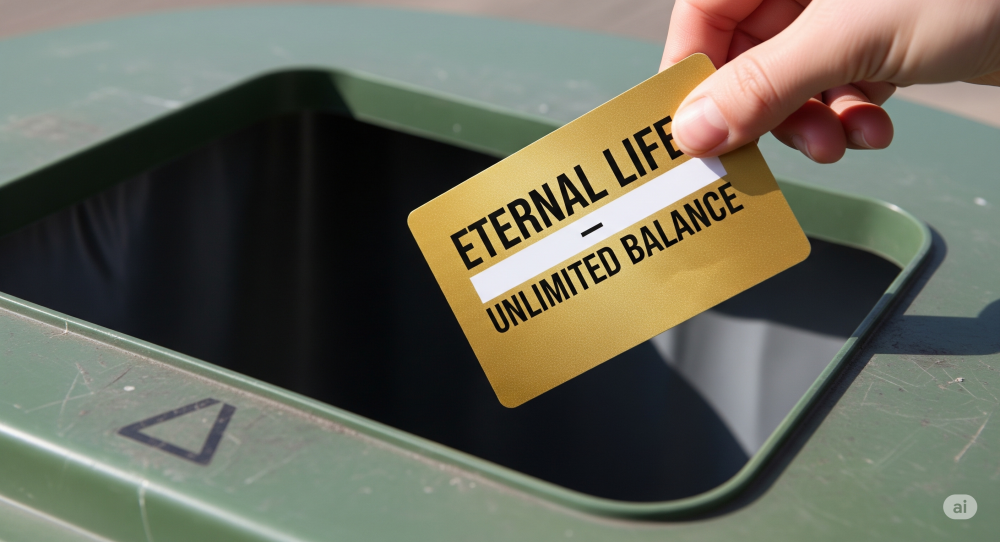
The belief in eternal security, often summed up as “once saved, always saved,” is a widely taught doctrine in many Christian circles. It asserts that once a person has truly accepted Christ, they cannot lose their salvation no matter what they do afterward. This idea often sounds comforting and spiritually secure, but is it actually biblical? Let’s look at the common arguments used to support eternal security and analyze them carefully through the lens of Scripture and Catholic teaching.

A New Creation That Can Still Choose
One common claim is that a Christian is a “new creation” and, therefore, cannot revert to their old self. Citing 2 Corinthians 5:17, proponents argue that for salvation to be lost, this new creation would have to be destroyed. However, this passage isn’t about an indestructible status change; it’s about transformation. Paul writes extensively elsewhere warning Christians not to fall back into sin (Galatians 5:4, 1 Corinthians 9:27). Becoming a new creation doesn’t negate free will. A covenant can be broken. Like a marriage, it starts with vows and a transformed life, but it requires ongoing faithfulness.
Redeemed by Blood, But Still Free to Walk Away
Another argument says that Christians are redeemed by Christ’s blood, referencing 1 Peter 1:18-19. The reasoning goes: how could God undo something so costly? Redemption indeed means a price was paid, but redemption doesn’t equal an unbreakable contract. Just as Israel was redeemed from Egypt yet many died in the wilderness due to rebellion (Hebrews 3:16-19), Christians can also walk away. God doesn’t revoke His purchase, but we can choose to forfeit the benefits of it.
Justification Is Conditional, Not Irreversible
Then there’s the argument from justification. Romans 5:1 says, “Therefore, since we have been justified through faith, we have peace with God through our Lord Jesus Christ.” It’s claimed that justification is a once-and-done verdict, and for salvation to be lost, God would have to reverse His judgment. But Paul himself conditions our security: “He will present you holy and blameless—if you continue in the faith” (Colossians 1:22-23). Justification is real, but it is covenantal. God doesn’t flip His judgment arbitrarily; rather, people can exclude themselves from His covenant through willful sin and rejection.

Eternal Life Is a Gift, Not a Guarantee
Perhaps the most emotionally powerful argument is based on John 3:16: “whoever believes in him shall not perish but have eternal life.” Some argue that if eternal life can be lost, then it isn’t eternal. But this misunderstands the term. The life God offers is eternal in quality and promise, but we must remain in Christ to enjoy it. The Greek verb for “believe” implies continuous action—ongoing belief, not a one-time profession. Eternal life is like a gift card with unlimited funds. But you still have to hold on to it and choose to use it. If you throw it away, the gift still exists, but you no longer benefit from it. The “eternal” refers to the quality and source of the life, not an irreversible possession.

Sealed with the Spirit—But Not Locked In
Ephesians 1:13-14 is often cited to argue that believers are sealed by the Holy Spirit, guaranteeing their inheritance. This “seal” is said to mean permanence. Yet Paul later warns believers not to grieve the Holy Spirit (Ephesians 4:30), suggesting that the seal is not inviolable. A seal marks ownership, not permanence. It’s more like a luggage tag than a padlock. God marks us as His own, but He does not override our freedom to walk away.
Glorification Is the Goal, Not a Guarantee
Romans 8:30 is used to claim that glorification is guaranteed for all who are justified. This verse outlines God’s intended plan, yes—but it doesn’t nullify the human response. Just two verses earlier, Paul warns, “if you live according to the flesh, you will die” (Romans 8:13). That death is spiritual, not just physical. Predestination refers to the plan God has for all who remain in Him, not a robotic outcome regardless of our choices.
God’s Gifts Are Irrevocable—But Invitations Can Be Declined
Romans 11:29 says, “God’s gifts and His call are irrevocable.” Eternal security advocates often apply this verse to individual salvation. However, the context is about God’s plan for Israel, not personal assurance. God will not revoke His invitation, but individuals can decline it. Think of it like an RSVP to a banquet (see Matthew 22:1-14): the invitation stands, but attendance depends on your response.
Real Believers Can Fall Away
Toward the end of their argument, many proponents of eternal security try to address objections by stating that anyone who lives in unrepentant sin or denies Christ was never really saved to begin with. They cite 1 John 2:19 and 1 John 3:6. But these verses don’t make a blanket statement about all believers who fall away. Scripture also tells of real believers who turned away: Judas Iscariot walked with Jesus; Demas abandoned Paul “because he loved this present world” (2 Timothy 4:10). The warnings throughout the New Testament—from Paul, James, Peter, and especially Hebrews—would be unnecessary if apostasy were impossible.

Nothing Can Separate Us—But We Can Walk Away
Romans 8:38-39 is often quoted to assure us that nothing can separate us from God’s love. And that’s true—no external force can remove us from Him. But Scripture also makes clear that we can choose to walk away. The love of a parent for a child doesn’t stop just because the child runs away—but that doesn’t mean the child is safe while wandering. Jesus’ parable of the Prodigal Son illustrates this beautifully. The father always loved his son, but the son had to return home.

Salvation Is a Journey, Not a One-Time Event
Catholic teaching affirms that salvation is a gift. But it also teaches that faith must be lived, nurtured, and persevered in. Jesus Himself said, “He who endures to the end will be saved” (Matthew 24:13). Salvation isn’t a one-time event; it’s a journey. We enter the covenant through grace, but we must remain faithful. As Paul says in Philippians 2:12, “Work out your salvation with fear and trembling.”
To summarize, the verses used to defend eternal security often speak of what God does at salvation, but they do not address what happens if someone walks away from that grace. Eternal life is indeed eternal—but only for those who continue in Christ. Like branches grafted into a vine, we must remain attached to bear fruit. If we disconnect, we wither (John 15:1-6).
Salvation is not fragile, but it is relational. God is faithful. He will not fail us. But He does not force us to remain. Scripture consistently warns against falling away, making it clear that our continued cooperation with grace matters.
Eternal security, while comforting on the surface, does not reflect the full testimony of Scripture. The Bible calls us to endurance, to obedience, and to a life lived in Christ—not a one-time decision that overrides our future choices.

In my perspective, yes. One can immediately lose salvation when their faith is gone. God gave us the faith of a mustard see. Not the size of the seed, but the strength of the seed. That’s the only seed that reproduces itself. It never dies. It’s up to us to nurture our faith.
Besides, pencils have erasers, and without our salvation (which can be lost), our name can be deleted from the book of eternal life.
Thank you for sharing your perspective. I agree that faith must be nurtured—Jesus’ mustard seed image reminds us that even small faith can grow strong if tended. Scripture also warns, as in Revelation 3:5, that our names can be blotted from the Book of Life if we turn away. God’s gift is precious, but He never forces us to keep it; He calls us to remain in Him and persevere to the end (Matthew 24:13).
This was such a thoughtful and well-balanced post. Thank you for addressing this often-debated topic with both clarity and grace. I completely agree that we are saved by grace—as Paul reminds us in Ephesians 2:8-9, “For it is by grace you have been saved, through faith—and this is not from yourselves, it is the gift of God—not by works, so that no one can boast.”
But as Paul also warns in Romans 6:1-2, “What shall we say then? Shall we continue in sin that grace may abound? Certainly not! How shall we who died to sin live any longer in it?” Grace doesn’t give us a license to continue in willful sin.
Personally, I believe that while we cannot “lose” our salvation as though God would simply revoke it, we can forfeit this precious gift through deliberate rejection or persistent rebellion. Hebrews 10:26-27 is a sobering reminder: “For if we go on sinning willfully after receiving the knowledge of the truth, there no longer remains a sacrifice for sins, but only a fearful expectation of judgment.”
It also brings to mind John 15:6, where Jesus said, “If anyone does not remain in me, he is like a branch that is thrown away and withers; such branches are picked up, thrown into the fire and burned.” This reminds me of the importance of abiding in Him—not out of fear, but out of love, reverence, and gratitude for what He has done.
Thank you once again for this encouraging and thought-provoking post. It truly blessed me today. May God continue to use your ministry for His glory! ????
Thank you for such a thoughtful and Scripture-rich comment. I truly appreciate how you’ve tied together Ephesians 2:8–9 and Romans 6:1–2, showing that the grace which saves us also calls us to live in holiness. You’re exactly right—grace is never a license to sin, and Paul’s words make that abundantly clear.
I also agree with your point that salvation is not something God casually “revokes,” but something we can freely walk away from through deliberate rejection or persistent rebellion. Hebrews 10:26–27 and John 15:6 give sobering warnings that align with this—reminding us that our relationship with Christ must remain living and active, not neglected or abandoned.
From a Catholic perspective, this is why the Church has always taught that salvation is both a gift and a covenant. God’s grace initiates and sustains it, but we must cooperate with that grace by remaining in Christ (John 15:4–5) and persevering in faith and obedience until the end (Matthew 24:13). The early Christians understood this tension well, and it’s why the apostles consistently warned believers against falling away.
Your emphasis on abiding in Him out of love, reverence, and gratitude is a beautiful summary of the Christian life. It’s not fear that keeps us in Christ—it’s love responding to His unfailing grace.
Thank you again for your kind words and for adding such depth to the discussion. May we both continue to encourage others to hold fast to Christ, not only in profession, but in the daily living out of our faith.
This is such a powerful and biblically grounded article—thank you for tackling a topic that’s often misunderstood and misrepresented. As a fellow believer, I’ve always wrestled with the “once saved, always saved” doctrine because, while it sounds comforting, it just doesn’t align with the full counsel of Scripture.
You made an excellent point about our free will remaining intact even after salvation. God, in His great love, never forces relationship—He invites, He redeems, and He empowers us by grace, but He doesn’t revoke our freedom to walk away. The example of Israel wandering after being redeemed from Egypt is such a clear and sobering parallel. Redemption isn’t a cage—it’s a covenant, and like all covenants, it requires our ongoing faithfulness.
I also appreciated how you brought up John 15 and the importance of “abiding” in Christ. Jesus didn’t say, “Once you’re in the vine, you’re good forever.” He warned us that branches not bearing fruit would be cut off. That doesn’t mean He stops loving us—but it does mean there are real consequences for turning away.
To me, one of the most beautiful—and challenging—truths in Scripture is that salvation is a relationship, not a transaction. As you said so well, it’s a journey. We must take up our cross daily (Luke 9:23), endure to the end (Matthew 24:13), and keep our lamps burning (Matthew 25). It’s not about living in fear, but living in faithfulness.
Thank you again for shining a light on the balance between God’s incredible grace and our ongoing response to it. He is faithful—but He calls us to remain faithful too. This article has blessed me, and I pray it reaches many hearts who are seeking a deeper understanding of what it really means to follow Jesus.
Grace and peace to you in Christ! ????✝️
Thank you so much for this deeply encouraging and thoughtful comment. Your words really affirm the heart of what I was trying to communicate in the article—that salvation isn’t a one-time transaction, but a living relationship that calls for an ongoing, faithful response.
You nailed it with the image of covenant versus cage. That’s a powerful way to put it. God doesn’t chain us to Him—He invites us into covenant, which, by nature, involves two parties walking together in faithfulness. He is always faithful on His end, but He won’t force us to remain if we choose to walk away.
I’ve had many conversations with proponents of once saved, always saved, and I’ve noticed a common theme: they’ll often cling tightly to verses that speak of faith or belief in isolation, but have trouble reconciling those with the full counsel of Scripture. Passages that emphasize obedience, perseverance, and the real possibility of falling away are often downplayed or explained away, rather than integrated into a cohesive, balanced understanding of salvation. But Scripture doesn’t contradict itself—it calls us to both faith and obedience, grace and cooperation.
Your reference to John 15, Luke 9:23, and Matthew 25 really drives that point home. Abiding in Christ isn’t a passive state—it’s active, daily, and intentional. And it’s not about fear, as you rightly said—it’s about fidelity. Just like a marriage thrives on daily acts of love and commitment, so does our walk with Christ.
I’m so glad the article resonated with you, and I truly appreciate your prayers that it might help others. Grace and peace to you as well—may we both keep running the race with endurance and joy!
As someone who’s not very familiar with Christianity but genuinely curious, I found this post really interesting and thought-provoking. I’ve heard the phrase “once saved, always saved” before, but I never really understood what it meant or how it’s viewed differently across Christian traditions. I appreciate how you broke it down and compared it with Scripture and Catholic teaching. This definitely helped me see that there’s a lot more depth and nuance to the topic than I expected. Looking forward to learning more from your future posts!
Thank you so much for your kind and thoughtful comment! I’m really glad the article helped shed some light on a topic that can be both confusing and deeply important. The phrase “once saved, always saved” is often taken at face value, but as you noticed, there’s a lot of nuance behind it—especially when you look at the broader sweep of Scripture and the consistent teaching of the Church from the earliest days of Christianity.
I really appreciate your openness and curiosity. That’s the best place to begin any journey of faith or understanding. If you ever have questions or want me to dive deeper into anything you come across, feel free to reach out or leave another comment. I’ll be sharing more posts that explore these kinds of questions, so stay tuned!
Thanks again, and God bless your search for truth.
Obviously, the author is a false teacher. If one could lose their salvation, the blood aqnd word of Christ isn’t sufficient to keep us saved and thus it wouldn’t be sufficient or able to save us in the first place. Security is GUARANTEED as GOD has sealed us by and with Himself and either He is omnipotent or He isn’t. If salvation could be lost, then Yeshua would repeatedly have to die, yet the Bible clearly teaches He died once and only once. The author blasphemes God’s word and impugns His character with every stroke of his pen. And some of you have the audacity to praise and thank him for his insight. This reflects that many of you like the author aren’t faithful to believe God, His word or His promises. The sealing is a GAURANTEE for as Revelation 3:8 reveals, what He has shut NO ONE can open and what He has opened, NO ONE can shut. And if he continues to teach the same garbage in opposition to what God says, then he ceases being a false teacher and rises to the level of a liar.
Thank you for sharing your conviction about God’s promises — I appreciate your passion and clarity. I understand why those verses about Christ’s sacrifice and the Spirit’s seal give you such strong confidence.
To make sure I’m hearing you clearly: you’re saying that if salvation could be lost, it would imply Christ’s sacrifice isn’t sufficient and the seal of the Spirit can be broken — and therefore teaching otherwise dishonors God or contradicts Scripture. I want to be sure I’m not misunderstanding your position.
Where I’d love to shift the discussion is away from isolated proof-texts and toward the broader biblical pattern. Through the New Testament we see salvation described as both God’s gracious gift and an ongoing relationship that requires endurance. That’s why Jesus can say both “No one can snatch them out of My hand” and “If you remain in Me.” Scripture doesn’t negate either truth — it affirms both.
So here’s a sincere question: if you believe losing salvation is impossible, how do you understand the many warnings Scripture gives to believers? For example, Paul warns that one can be “disqualified” (1 Corinthians 9:27), and the writer of Hebrews cautions believers not to fall away.
Just to be clear: I’m not claiming salvation is fragile or that God fails to keep His promises. Scripture faithfully affirms that salvation is a gift of grace and that God is faithful. The point is simply that Scripture also allows for human freedom — that love can be accepted or rejected, and God does not override our freedom to respond.
Grace is not a safety net that automatically protects us no matter what we do; it’s a relationship we must continue to nurture by living in Christ through faith, obedience, and perseverance.
Thank you for engaging seriously. I value these conversations — and more than “winning” a debate, my hope is that we both grow in reverence for Scripture and deeper trust in God’s faithfulness.